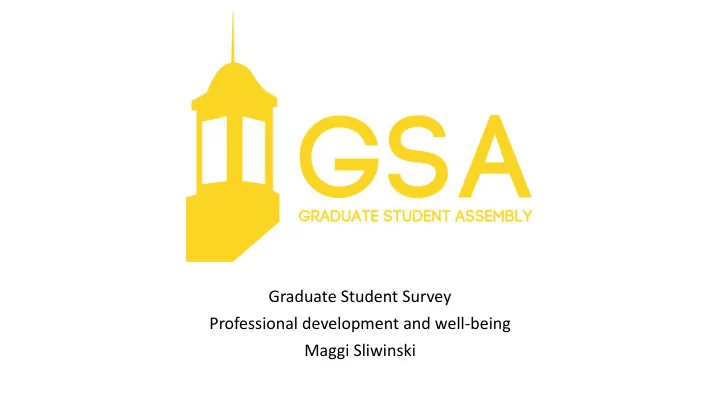

Graduate Student Survey Professional development and well-being Maggi Sliwinski
History • Began developing survey questions in Fall 2015 • Focus on professional development, well-being, and degree completion • Reviewed by GSA, Bureau of Sociological Research, Graduate Studies • Piloted by committee chairs and executives in spring 2016 • Research approved by Institutional Review Board on April 20, 2016
Network Preparing for Graduate student analysis academic career experience Code of Conduct Self-handicapping (Propper 2012) (Kearns et al. 2008) Factors affecting Attributes for careers women (Holmstrom Advising roles and (Manathunga & Lant and Holmstrom 1974) productivity (Green and 2006) Group cohesiveness Bauer 1995) and support, peer Variety of topics mentoring (Dorn and (Anderson and Swazey Paplewis 1997) 1998) Grad school as socialization, Retention/Attrition increasing demands on faculty, little training; Preparing for non- TTC (Seagram Guidance on developing et al. 1998) skills/ transferring skills academic career Departmental factors Departmental outside academe not relating to completion attrition/ways to available (Austin 2002) (Valero 2001) improve (Golde 2005) First-year attrition CGS 2014 (Golde 1998) Student vs Faculty attribution of attrition Core competencies Generic skills debate — Employability attributes and support services developed by PhD list of skills suggested (Golovushkina and (Gardner 2009) students (Durette et al. and question for study Milligan 2012) 2014) Well-being (Pychyl and (Gilbert et al. 2004) Little 1998) Work-life Reforms needed balance Attribute development (Lester 2013) Transferable skills (Manathunga et al. (Morrison et al. 2011) 2009) Enterprising skills Unions (Whitford 2014) (Lean 2012) Better training, Work-life balance evaluations, Skills preparation (Mason et al. 2009) Integrated PhDs (Porter exploitation (Anderson (Wheadon 2014) and Phelps 2014) and Swazey 1998)
(quant) How does job preparation contribute to graduate degree completion? (qual) What can the university do to improve completion?
Topics covered • Relationship with advisor • Career preparation and job search activities • Professional development opportunities and productivity • Transferable skills • Teaching assistantships • Departmental climate and program cohesiveness • Well-being • Imposter syndrome • Degree completion • Financial status • Demographics
Distributing survey • Email with link to survey sent by Office of Student Affairs on January 31, 2017 • Reminder email with link sent from Office of Student Affairs on February 14, 2017 • Total emails: 5126 • Total complete responses: 475 (9.2%)
UHC, 48% used
CAPS, 18% used
Career Services, 9.5% used
Student Money Management Center, 3% used
Grant writing workshop, 81 used
Career Fair through Career Services, 78 used
Application review: Application review: Career Services, 51 used Graduate Studies, 19 used
Resources in departments: Ombudsperson or grievance committee 400 374 300 200 100 72 67 12 0 Not available Available but Available and Don't know not adequate adequate Highlights: School of Natural Resources, Educational Administration, Legal Studies
Resources in departments: Graduate student handbook 350 298 300 250 200 150 138 100 69 50 19 0 Not available Available but Available and Don't know not adequate adequate
Resources in departments: Family and medical leave posted 500 387 400 300 200 83 100 42 12 0 Not available Available but Available and Don't know not adequate adequate Highlights: Agronomy and Horticulture, Educational Administration, Entomology, MBA
Financial Status 0 50 100 150 200 250 300 350 400 450 500 I am confident that I will I am not sure I will I probably will have have sufficient funds to have enough funds to enough funds to complete my studies. complete my studies. complete my studies.
Relationship with advisor Departmental climate Well-being Program cohesiveness Imposter syndrome Transferable Skills Completion (being developed) Job confidence Productivity (single number) Career prep activities Demographics: age Financial status Cronbach’s alpha used to check for internal consistency. P -value < 0.05
Relationship with advisor Departmental climate Program cohesiveness Well-being Imposter syndrome Job confidence Transferable Skills Productivity (single number) (being developed) Career prep activities Financial confidence
Relationship with advisor Departmental climate Transferable Skills Program cohesiveness (being developed) Imposter syndrome Productivity (single number) Career prep activities
Well-being Relationship with advisor Departmental climate Program cohesiveness Imposter syndrome Completion Job confidence Transferable Skills Productivity (single number) (being developed) Demographics: age Career prep activities Financial confidence
Recommend
More recommend